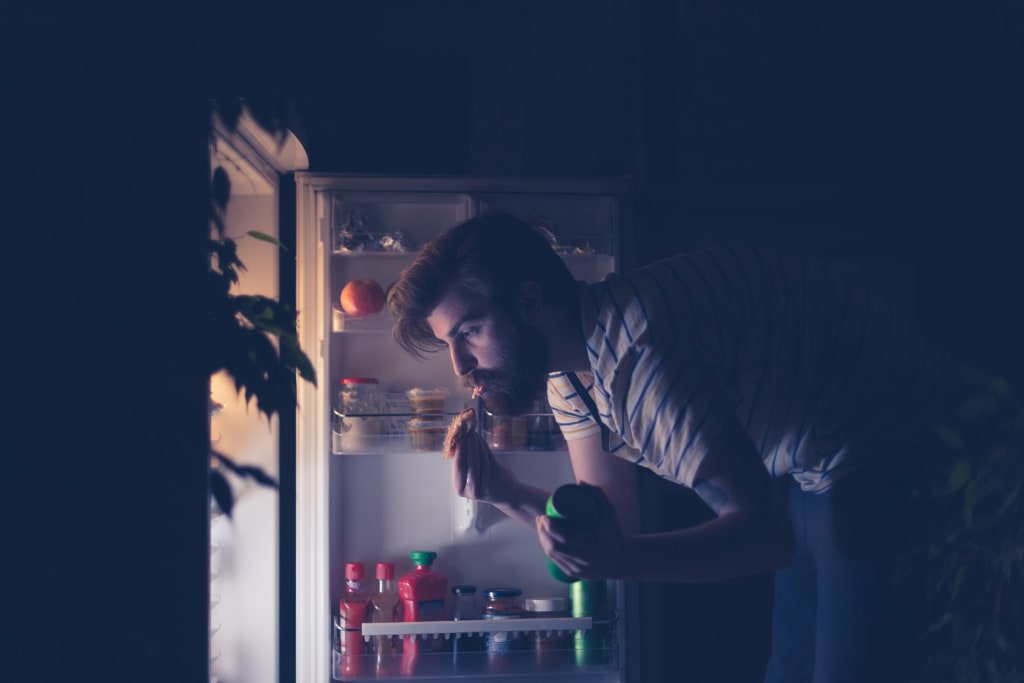More than Enough
Stress eating my way through Covid-19

There I was, sitting at my kitchen table, blissfully watching a video on fireflies. The sheer brilliance and magic of their performance nearly brought me to tears. With theatrical elegance and choreography to rival that of my city’s renowned Royal Winnipeg Ballet, tiny, winged dancers darted and flickered through each Grande Jeté, each Pirouette, with ethereal perfection across a forest stage of moss and lichens. In my state of revelry I barely noticed that my son had entered the room and stood watching, the fireflies, over my shoulder.
Turning my head with a smile on my face, I saw him as he shrugged his shoulders. Moving away he said, “Ya, but do they do anything?” with the subtlety of a sledgehammer. Just like that. THUD. The magic ended. “Do they do anything?” I sputtered. “What else would you want them to do? They already do MORE THAN ENOUGH!” He laughed and left me fuming, alone in the kitchen where I grabbed a handful of crackers from a box left open on the counter, before returning to watch the fireflies in their dance. Later, after cooling down a bit, I wondered why I’d used the phrase, more than enough in reaction to my son’s comment, and I began reflecting on those words: where I’d first heard them and what they actually meant to me.
This is as good a place as any to mention that we are in the midst of a pandemic as I write these reflections. Life no longer resembles what it did six weeks ago, and no one can imagine with any sense of integrity what the landscape of our lives will look like six days, much less six weeks, down the road. In short, a life of uncertainty has created an overwhelming sense of anxiety that, while it does not quite reach the level of feeling impending doom breathing down my neck, it most definitely surpasses the frustration brought about by typical disruptions in my typical day-by-day life. By far. I am feeling stress all the way down to my bones and, like many others, my tolerance for even the smallest insults that life routinely hurls my way is short. Very short.
Growing up in the 1970’s in a household where more than enough was a commonly used expression, that phrase has, not surprisingly, made its way into my own vernacular. However, the meaning never quite gelled through its use that vacillated from that of a welcoming invitation, to that of a not-so-subtle suggestion of wrong doing. Often, that 180 degree turn was taken suddenly and without warning. For example, when I asked, “Mom, can Kelly stay for dinner?” the reply would usually be, “There’s more than enough to go around.” However, by the time the plates were cleared and dessert was served, I would likely hear the refrain in the form of a stern reprimand, “Chrissy, that’s more than enough. You look a little hefty sitting beside your friend.” I learned early on that the correct thing to do was to pass on my mother’s pineapple upside-down cake while seated at the dinner table, only to then creep into the kitchen late at night while others slept and nibble around the edges of the leftovers. Throughout my childhood and teenaged years, by all accounts and in every photo from that time period, I remained a normal-sized girl. However, by the time I was in my mid 30’s, my mouselike habit of nibbling around the the edges of leftovers had turned into compulsive snacking at odd hours, so long as no one was around to catch me in the act. Most of this abnormal eating took place at night. My weight ballooned and I became the image of what my mother presumably thought she was helping me avoid all those years ago. I’d be inclined to ask her directly if that had been her intention, if she were alive today. The alternative explanations of my mother simply being unaware of the effect her words had on me (she was not) or that she deliberately chose to bully her own daughter (a terrible thought) are both hard pills to swallow.
The Diagnostic and Statistical Manual of the American Psychiatric Association (DSM) tells us those who slip down for food while everyone else is asleep likely suffer from a mental health disorder called Night Eating Syndrome (NES). However, studies of people with NES have instead linked the condition to measurable levels of CRH—corticotropin-releasing hormone. CRH is always present in the body, but levels increase in response to emotional stimuli such as stress. This in turn sparks off a chain of chemical events in the brain, including stimulating the release of stress hormones such as cortisol and adrenaline. There is a growing body of evidence that suggests sufferers of NES crave carbohydrates, especially the overly processed carbs that are high in sugar and flour. Their consumption results in a rapid increase in levels of serotonin, the feel-good brain chemical, which also helps stimulate sleep. In other words, consuming these highly processed, high in flour and sugar foods at night when the calories cannot be effectively burned off, has the effect of self medicating people by increasing the brain chemicals directly responsible for dealing with anxiety, depression and a desire to sleep. But we, who experience the unfolding of this nightly drama, are told with relentless vigour from society that we are doing this to ourselves. If we had any sense at all, we would stop. We deserve to be fat, unhealthy and undesirable.
In 1999, Drs. Grethe Birketvedt and Johan Sundsfjord, experts from the University of Tromso, Norway, led a study and later wrote about their findings in the American Journal of Physiology - Endocrinology and Metabolism. Their research and conclusions, based on scientific evidence, were able to prove that this condition has a physical basis similar to other disorders such as chronic fatigue syndrome, anorexia, bulimia, insomnia and depression. Science is disproving the common belief that eating disorders are related to a flawed state of mind, or weak character including a lack of willpower. No. Rather, they are linked to a measurable imbalance of brain chemicals over which an individual has little control. Society, and even the medical community at large, are slow to understand the message conveyed in the research data.
However, I did not say that individuals have no control over their own eating habits, only that there are factors already in motion (such as the release of neurochemicals in the brain) that drive a person to behave in certain maladaptive ways when it comes to food. Let me return to my previous discussion of the phrase more than enough and expand on what these words actually mean—not to me—to my brain. When I consider my own behaviour around food, and my history of eating at night in order to hide my food addiction (for that is what it is), it is clear to me how my brain has come to interpret those three words. They signal that, 1. There is plenty of food available, 2. I am not worthy to share in that food, and therefore 3. I must be stealthy in how I gather my food, lest it is taken away and I go hungry. Isn’t it ironic that in choosing the words she did to try and dissuade me from eating the tastiest part of a meal—dessert—my mother’s words created in me a nearly perfect switch, which triggers an overwhelming need to overindulge, but not be seen doing so.
From early on in my life, eating has been a stressful activity for me. You might think, looking at photos of me from several years ago when I was in the worst throes of food addiction and at my highest weight of 304.8 lbs., that food was the one and only pleasure in my life. You might assume that I dreamt of eating, delighting in the anticipation of my next stop at a fast food joint. You would be wrong on two counts: I gave up eating fast food long before I lost control of my weight, and any thoughts I experienced regarding food were not dreams, but nightmares. Food has rarely been a source of pleasure in my life, but it has often been a source of compulsion, followed by deep shame.
I have been living in a close-to-normal-size body for a year, yet it still feels painful to eat, especially when there is no one else around whom I can feel accountable to. Being out of work paired with social distancing means that most days now, I must face eating on my own. It scares me, not having anyone close by to share a meal with, even though I know that the only person I can ever truly be accountable to is—me. Now, with the Covid-19 pandemic in full-swing, I am also experiencing even greater amounts of stress than I typically do. I can’t control the release of cortisol and adrenaline into my system, occurring as part of my brain’s response to stress, nor its release of serotonin in an attempt to try and improve my mood. Prior to the pandemic, I had learned to successfully manage the amounts of stress I am typically faced with during my day-to-day existence through breathing exercises, meditation, daily walks, frequent check-ins with friends and writing in my gratitude journal. However, there is nothing typical with regard to our current situation.
But there is one more thing that I will be adding to my tool box for stress management. I’ve decided I need to expunge the phrase more than enough from my language. In its current form, laden with conflicting meanings and underlying ambiguity, it harms my emotional state and further weakens that wall of safety behind which I keep my eating disorder at bay. Instead, I will look down at my carefully portioned plate of food at each meal, feel genuine gratitude and say aloud, “this is enough”, because it is.
It is exactly enough.
About the Creator
Christina Perry
Christina is a traveler, a dreamer and a poet. Her writing is often influened by her work as a speech-language pathologist in Northern Manitoba with First Nations peoples.






Comments
There are no comments for this story
Be the first to respond and start the conversation.